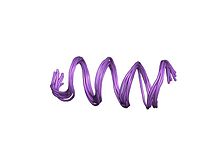| Ter | |||||||||
|---|---|---|---|---|---|---|---|---|---|
 Nmr study of the proline repeat from tus Nmr study of the proline repeat from tus | |||||||||
| Identifiers | |||||||||
| Symbol | Ter | ||||||||
| Pfam | PF05472 | ||||||||
| InterPro | IPR008865 | ||||||||
| SCOP2 | 5eau / SCOPe / SUPFAM | ||||||||
| |||||||||
In molecular biology, the ter site, also known as DNA replication terminus binding-site, refers to a protein domain which binds to the DNA replication terminus site. Ter-binding proteins are found in some bacterial species, and include the Tus protein which is part of the common Ter-Tus binding domain. They are required for the termination of DNA replication and function by binding to DNA replication terminator sequences, thus preventing the passage of replication forks. The termination efficiency is affected by the affinity of a particular protein for the terminator sequence.
In E. coli, there are 10 closely ter related sites encoded in the chromosome. The sites are designated TerA, TerB, ..., TerJ. Each site is 23 base pairs.
Function
A DNA replication terminus (Ter) has a role in preventing progress of the DNA replication fork. Therefore, a DNA replication terminus site-binding protein binds to this site helping to block the DNA replication fork. There are two genes controlling Ter-binding activity, named tau and Tus.
References
- ^ Hidaka M, Kobayashi T, Takenaka S, Takeya H, Horiuchi T (December 1989). "Purification of a DNA replication terminus (ter) site-binding protein in Escherichia coli and identification of the structural gene". J. Biol. Chem. 264 (35): 21031–7. doi:10.1016/S0021-9258(19)30040-7. PMID 2687269.
- Mulcair, M.; Schaeffer, P.; Oakley, A.; Cross, H.; Neylon, C.; Hill, T.; Dixon, N. (2006). "A Molecular Mousetrap Determines Polarity of Termination of DNA Replication in E. Coli". Cell. 125 (7): 1309–1319. doi:10.1016/j.cell.2006.04.040. PMID 16814717.
- Hidaka M, Kobayashi T, Horiuchi T (1991). "A newly identified DNA replication terminus site, TerE, on the Escherichia coli chromosome". J Bacteriol. 173 (1): 391–3. doi:10.1128/jb.173.1.391-393.1991. PMC 207198. PMID 1824765.